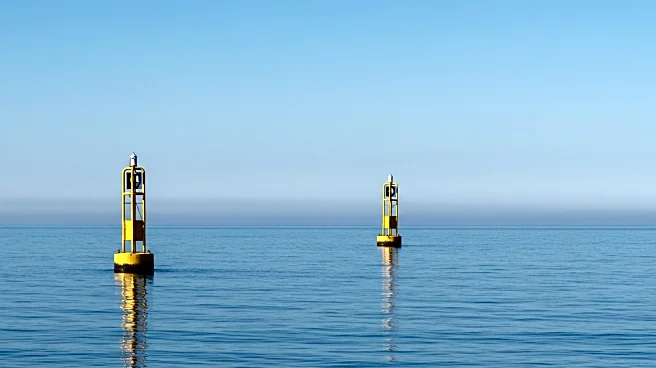What's Happening?
Indonesia and Malaysia are engaged in diplomatic discussions to resolve disputes over oil-rich offshore blocks in contested waters. Indonesia's Deputy Foreign Minister Arif Havas Oegroseno emphasized the preference for negotiation over legal action, citing historical territorial disputes that have remained unresolved for centuries. The contested area involves overlapping claims to the continental shelf and exclusive economic zone off Borneo's eastern coast, known as Ambalat in Indonesia and Sulawesi Sea in Malaysia. The last major escalation occurred in 2005 when Malaysia granted oil exploration rights to Shell Plc, leading to a military standoff. Both nations are exploring a joint development plan as a pragmatic alternative to legal settlements, with Indonesian President Prabowo Subianto and Malaysian Prime Minister Anwar Ibrahim expressing goodwill towards a resolution.
Why It's Important?
The resolution of this dispute is significant for regional stability and economic development. The contested offshore blocks are rich in oil resources, which are crucial for both countries' energy needs and economic growth. A diplomatic resolution could enhance bilateral relations and prevent potential military confrontations, fostering a cooperative environment in Southeast Asia. The approach reflects Indonesia's broader strategy in maritime disputes, prioritizing stability and bilateral engagement over binding settlements that could pose political and economic risks. Successful negotiations could set a precedent for resolving similar disputes in the region, promoting peace and collaboration.
What's Next?
Indonesia and Malaysia are expected to continue their diplomatic talks, with both sides showing willingness to explore joint development plans. The discussions are at an early stage, and a final agreement has yet to be reached. The twice-yearly negotiations covering both land and maritime boundaries will likely continue, with personal ties between chief negotiators aiding smooth communication. The outcome of these talks could influence future maritime boundary negotiations in the region, potentially leading to more collaborative approaches to resource management.
Beyond the Headlines
The diplomatic approach to resolving the dispute highlights the importance of legal certainty in boundary negotiations. Once an agreement is reached, it cannot be changed, underscoring the need for careful deliberation and mutual understanding. The situation also reflects broader geopolitical dynamics in Southeast Asia, where countries must balance national interests with regional cooperation. The resolution of this dispute could contribute to a more stable and integrated regional framework, enhancing economic and security collaboration among Southeast Asian nations.









